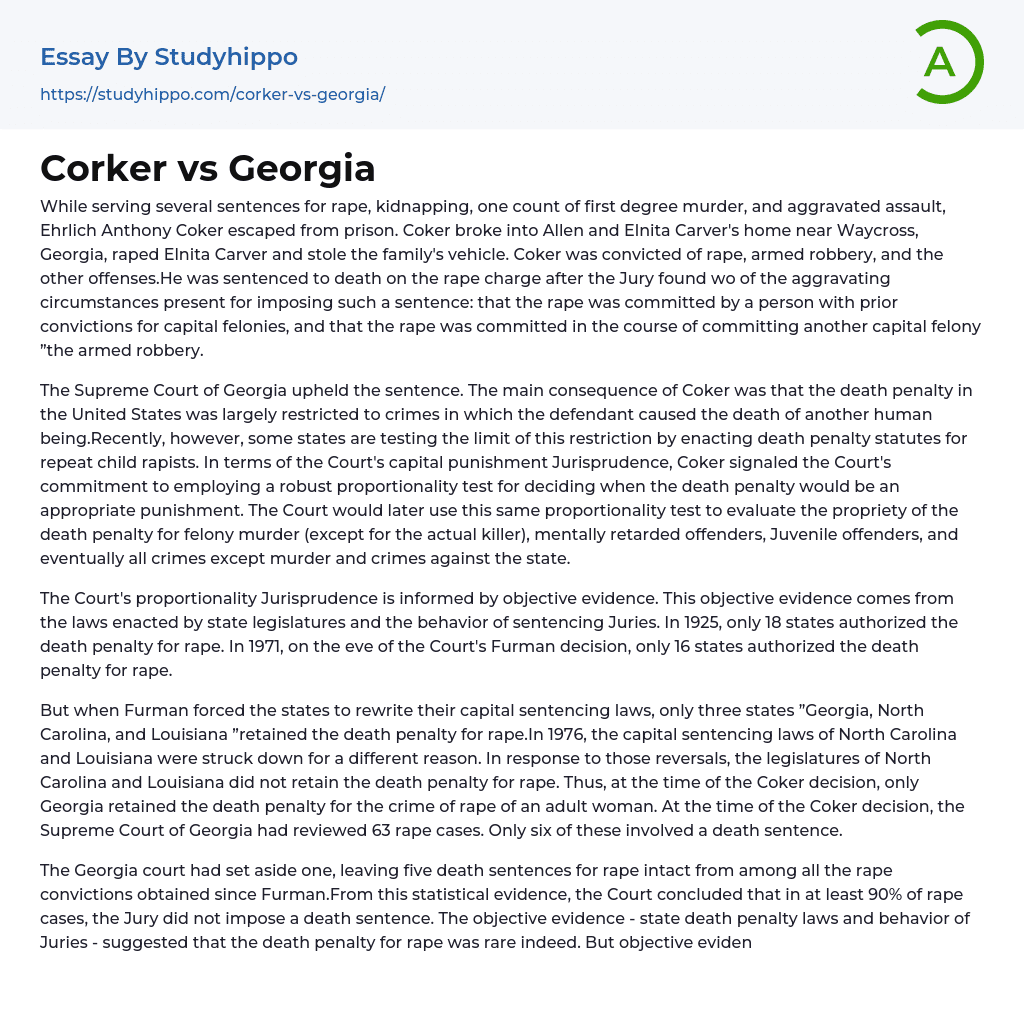While serving several sentences for rape, kidnapping, one count of first degree murder, and aggravated assault, Ehrlich Anthony Coker escaped from prison. Coker broke into Allen and Elnita Carver's home near Waycross, Georgia, raped Elnita Carver and stole the family's vehicle. Coker was convicted of rape, armed robbery, and the other offenses.He was sentenced to death on the rape charge after the Jury found wo of the aggravating circumstances present for imposing such a sentence: that the rape was committed by a person with prior convictions for capital felonies, and that the rape was committed in the course of committing another capital felony ”the armed robbery.
The Supreme Court of Georgia upheld the sentence. The main consequence of Coker was that the death penalty in the United States was largely restricted to crimes in which the defendant caused the death of another human be
...ing.Recently, however, some states are testing the limit of this restriction by enacting death penalty statutes for repeat child rapists. In terms of the Court's capital punishment Jurisprudence, Coker signaled the Court's commitment to employing a robust proportionality test for deciding when the death penalty would be an appropriate punishment. The Court would later use this same proportionality test to evaluate the propriety of the death penalty for felony murder (except for the actual killer), mentally retarded offenders, Juvenile offenders, and eventually all crimes except murder and crimes against the state.
The Court's proportionality Jurisprudence is informed by objective evidence. This objective evidence comes from the laws enacted by state legislatures and the behavior of sentencing Juries. In 1925, only 18 states authorized the death penalty for rape. In 1971, on the eve o
the Court's Furman decision, only 16 states authorized the death penalty for rape.
But when Furman forced the states to rewrite their capital sentencing laws, only three states ”Georgia, North Carolina, and Louisiana ”retained the death penalty for rape.In 1976, the capital sentencing laws of North Carolina and Louisiana were struck down for a different reason. In response to those reversals, the legislatures of North Carolina and Louisiana did not retain the death penalty for rape. Thus, at the time of the Coker decision, only Georgia retained the death penalty for the crime of rape of an adult woman. At the time of the Coker decision, the Supreme Court of Georgia had reviewed 63 rape cases. Only six of these involved a death sentence.
The Georgia court had set aside one, leaving five death sentences for rape intact from among all the rape convictions obtained since Furman.From this statistical evidence, the Court concluded that in at least 90% of rape cases, the Jury did not impose a death sentence. The objective evidence - state death penalty laws and behavior of Juries - suggested that the death penalty for rape was rare indeed. But objective evidence does not dictate the outcome of the Court's proportionality analysis. The Court also brings to bear its estimation of how the death penalty in the circumstances in question would serve the goals of retribution and deterrence.
Rape is a serious crime - "short of homicide, it is the ultimate violation of self. " It typically involves violence and injury, both physical and psychological, but the Court denied that it involves "serious" injury. "Rape is without doubt deserving of serious punishment; but in terms
of moral depravity and of the injury to the person and to the public, it does not compare with murder, which does involve the unjustified taking of human life. " In light of these facts, the Court concluded that death was an excessive punishment for "the rapist who, as such, does not take human life.The fact that the Jury had found that two aggravating factors applied to Coker's crime - is prior convictions and the fact that the rape was committed during the course of a robbery - did not change the Court's conclusion. The rape may have been committed during the course of another crime, and by a hardened criminal, but the rape did not escalate into a killing. Finally, even a deliberate killing does not merit a death sentence under Georgia law absent the finding of aggravating factors. These facts bolstered the Court's conclusion that the death penalty was a constitutionally excessive punishment for rape.
- Affirmative Action essays
- Assisted Suicide essays
- Capital Punishment essays
- Censorship essays
- Child Labour essays
- Child Protection essays
- Civil Rights essays
- Corporal Punishment essays
- Death Penalty essays
- Empowerment essays
- Euthanasia essays
- Gay Marriage essays
- Gun Control essays
- Human Trafficking essays
- Police Brutality essays
- Privacy essays
- Sex Trafficking essays
- Speech essays
- Afghanistan essays
- Africa essays
- America essays
- Asia essays
- Australia essays
- Caribbean essays
- City essays
- Developing Country essays
- Dubai essays
- Earthquake essays
- Europe essays
- Fracking essays
- Georgia essays
- Middle East essays
- Natural Disaster essays
- New Zealand essays
- North Korea essays
- South Korea essays
- Thailand essays
- Travel essays
- Animal Cruelty essays
- Charles Manson essays
- Crime Prevention essays
- Crime scene essays
- Criminal Justice essays
- Criminology essays
- Cyber Crime essays
- Damages essays
- Detention essays
- Distracted Driving essays
- Drug Trafficking essays
- Drunk Driving essays




